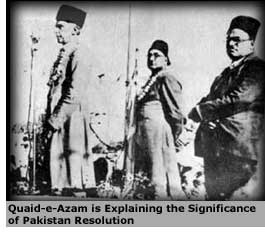resolution day in PAKISTAN

Pakistan was not born suddenly. Its origin goes back at least to the 1857 War of Independence. Several Zonal or Partition Schemes and Pakistan Plans were being aired from time to time.The Lahore Resolution was though a land-mark and turning point in this direction.
In fact, the first formal step taken by Muslim League towards Pakistan, was Allama Iqbal’s Presidential Address at Allahabad Session on 29 December, 1930, but it was only after the Lahore Resolution had been passed that Pakistan began to be openly discussed and debated bipartisanly in the media and by other means.
The Quaid-i-Azam and the Muslim League decided upon the partition of the subcontinent after trying all possible avenues of a peaceful agreement with the Hindu leaders.
The attitude of the Hindu leaders convinced him and other leaders of the League that the Muslims could safeguard their religion and culture only in a separate country. The difference between the Hindus and the Muslims were fundamental and historical. They differed not only in religion but they belonged to two different civilizations. Hence it had become inevitable that they should have their own homeland in India. It was on 23 March, 1940 that A.K.Fazal-ul-Haq moved the historic Lahore Resolution, in the history making annual session of the All-India Muslim League held at Lahore.
The resolution stated that:
"It is the considered view of this session of the All India Muslim League that no constitutional plan would be workable in this country or acceptable to Muslims unless it is designed on the following basic principles, viz., that geographically contiguous units are demarcated into regions which should be so constituted, with such territorial readjustments as may be necessary, that the areas in which the Muslims are numerically in a majority, as in the North-Western and Eastern zones of India, should be grouped to constitute Independent States’ in which the constituent units shall be autonomous and sovereign."
>"This session further authorizes the Working Committee to frame a scheme of constitution in accordance with these basic principles, providing for the assumption finally by the respective regions of all powers such as defence, external affairs, communications, customs and such other matters as may be necessary."
The Resolution was unanimously accepted by the participants who had assembled at the meeting place in a large number. The Resolution was seconded by a number of prominent Muslim leaders from all over the country. Those who seconded the Resolution were “Maulana Zafar Ali Khan and Dr. Muhammad Alam (Punjab), Begum Maulana Muhammad Ali Johar, Abdul Hamid Badayuni, Chaudri Khaliq-uz-Zaman and Syed Zakir Ali (U.P.), Sir Abdullah Haroon (Sindh), Sardar Aurangzeb Khan (N.W.F.P), Qazi Muhammad Issa (Balochistan), Nawab Muhammad Ismail (Bihar), Syed Abdur Rauf Shah (C.P.); Abdul Hamid Khan (Madras), and I.I. Chundrigar (Bombay).
The Muslims responded to the Resolution with amazement and hope for a better future. They gathered under the dynamic leadership of the Quaid-i-Azam who gave new meaning and shape to their quest for Independence. The acceptance of Pakistan Resolution strengthened the Two-Nation Theory which was the basis of Muslim’s struggle for Independence.
The actual importance of the Resolution was unmistakable and it categorically asserted the right of the Muslims to self-determination. The Hindu-Congress reaction against the Resolution came as a two-fold blessing in disguise. "It gave its proper name to it, i.e., the Pakistan Resolution, thus helping to crystallize the cause and channel the Pakistan Movement."
The verbal quibbling and criticism elicited a positive response in the form of necessary clarifications. They helped to improve the loosely legalistic language of the Resolution in keeping with the then prevalent constitutional style of the lawyer leaders on the political scene on both sides, the Congress and the Muslim League. However, the Resolution never appeared in its amended form. Yet we have it on good authority that the term "Independent States" was substituted by the word “State” through the unanimous resolution of 470 newly elected Muslim legislators of the Central and Provincial Assemblies at their Delhi Convention on 8-9April, 1946. The Quaid was in the chair. This Resolution openly talked of Pakistan Zones’, demanding the ‘Sovereign Independent State’ of Pakistan.
March 23rd, also known as the Pakistan Day Pakistan Resolution) is commemoratedevery year by Pakistanis. Nations celebrate this days to rejoice and celebrate the fruits of freedom and progress Besides observing a public holiday to commemorate such an important day, meetings, official parades, seminars, exhibitions etc. are arranged







